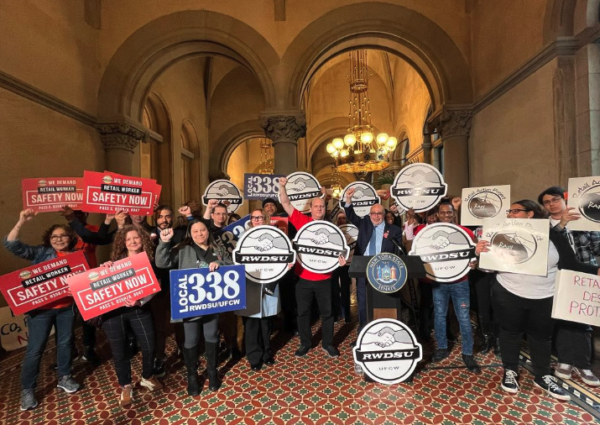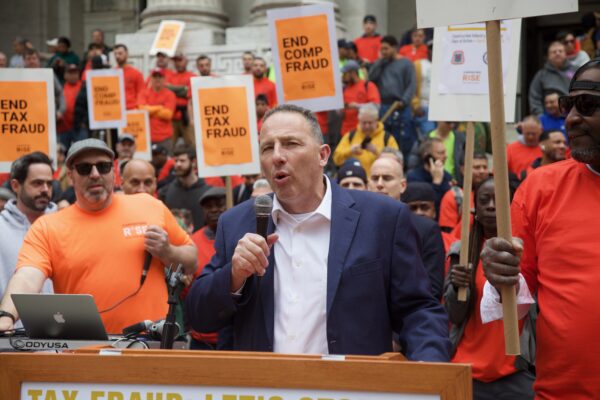Compiled by Steven Wishnia and Neal Tepel
VW Vote Challenge Faces Legal Test
The United Auto Workers’ challenge to last month’s vote at the Volkswagen plant in Tennessee may depend on whether the National Labor Relations Board rules that outside parties’ behavior qualifies as “intimidation.” The NLRB usually judges that by the five-factor “Westwood test”: whether the threats would affect all voting workers, were widely made, could be carried out by the person who made them, and coincided with the election, and whether employees acted or voted in fear of them. The UAW contends that “the threat to eliminate state incentives” if workers unionized met those criteria because it “was made by powerful political leaders who, in fact and in the reasonable perception of employees, were quite capable of putting their threat into effect.”
Seattle Minimum-Wage Activists Hit ‘Swiss Cheese’ Plan
Seattle Mayor Ed Murray hopes to unveil a proposal by late spring that would raise the city’s minimum wage to $15 an hour, but leading advocates of the increase suspect his proposal will have too many loopholes. The mayor’s advisory committee is considering phasing in the $15 wage gradually, exempting small businesses and nonprofits, and giving credits for health insurance or tips. “We are not interested in a measure that is 15 in name only but has more holes than Swiss cheese,” responded Socialist City Councilmember Kshama Sawant, who made the $15 minimum the main theme of her campaign last fall.
Hospital Workers Push for Union in Pittsburgh…
Hundreds of people rallied in the cold, slushy streets of downtown Pittsburgh Mar. 3 to demand that the University of Pittsburgh Medical Center recognize a union and pay higher wages. “Seventy-seven years ago today, the steelworkers of this community won their union from U.S. Steel,” Neal Bisno, president of SEIU Healthcare Pennsylvania, told the crowd. “Seventy-seven years later, the workers of UPMC are going to get UPMC to recognize the union for them and to give them the right to form a union.” UPMC worker Chaney Lewis said that despite having nine years on the job and special training to transport heart monitor patients safely, “I only make $11.97 an hour.” UPMC management says that they pay service workers more than other local employers do.
…And Win Contract in Altoona
Registered nurses at University of Pittsburgh Medical Center in Altoona voted overwhelmingly Feb. 28 to ratify a three-year contract that wins them annual raises of 2% or more. The deal preserves staffing guidelines that UPMC had wanted to make more “flexible” after it took over the hospital last July and adds a “code green” team of employees that will be available to help when nurses feel overwhelmed, said nurse Sue Delozier, a member of the negotiating team. She also said a 24-hour strike starting Feb. 11 had broken the impasse in negotiations, by showing the hospital that the nurses were unified.
It’s a Small Paycheck After All: Disney World ‘Cast Members’ Protest
Nearly 1,000 workers at Walt Disney World in Orlando, Florida rallied Feb. 24 to demand higher pay and better benefits. “Two-thirds of our members earn less than $10.10 an hour, so we have people living on $8 or $9 an hour, which is very, very difficult,” said UNITE HERE Local 737 President Jeremy Cruz-Haiken, which together with Local 362 represents more than half of Disney World’s 66,000 “cast members.” The two unions’ current contract expires March 29.
AFT Website Tracks For-Profit Charter Schools
The American Federation of Teachers launched a Web site called “Cashing in on Kids” Feb. 28 to track the nation’s five largest for-profit charter-school organizations. The site, cashinginonkids.com/, posts news and information about K12 Inc., Imagine Schools, White Hat Management, Academica, and Charter Schools USA. The AFT is running it in collaboration with In the Public Interest, a Washington-based “resource center on privatization.” “It's a way of calling the question: Is the rapid expansion of charter schools about helping kids learn, or about enabling for-profit operators to rake in millions in tax dollars?” AFT president Randi Weingarten said in the announcement.
Deal Averts Strike at University of California
The University of California system reached a tentative contract agreement with AFSCME Local 3299 Feb. 27, averting a strike planned for Mar. 3 by 8,300 custodians, gardeners, and other service workers at its 10 campuses. The four-year deal calls for an immediate 4.5% raise and 3% annual increases through 2016, but workers will have to contribute 9% of their pay for pensions and retiree health-care benefits. Negotiations continue with the 13,000 patient-care employees at the university’s medical centers and clinics, who are also represented by Local 3299.
Alabama Shipyard Boom Fuels New Union Campaign
A shipbuilding boom in Mobile, Alabama, may be the key to unionizing shipyard workers there. Union shipbuilding disappeared when the industry collapsed in the 1980s and 1990s, and Austal USA, an Australia-based company builds ferries and warships, has fought off organizing since it opened there in 2001. But six unions in the AFL-CIO’s Metal Trades Department have launched a new campaign there, and department president Ron Ault says that massive hiring of skilled workers is giving unions an opening. The campaign will be “a tough one,” says lead organizer Keith Maddox, but unions have won victories at other Gulf Coast shipyards, at Avondale in Louisiana and in Pascagoula, Mississippi.
Teamsters Office Workers Join IBEW
The three women who work at the offices of Teamsters Local 41 in Kansas City have joined a union—Local 124 of the International Brotherhood of Electrical Workers. The three said they needed job security against being replaced if the local elected new leadership. “This sets us equal with our membership,” said Nancy Yoke. Local 41 president Vic Terranella supported his office’s effort to organize, but national president James Hoffa said it would be a conflict of interest if they were represented by another Teamsters local.
S.F. Unions Declare Health-Cost Emergency
With health-insurance premiums in California almost tripling since 2002, San Francisco unions are campaigning to rein in price-gouging by insurers. “Rising costs have to be dealt with or working people will continue falling behind,” says Ian Lewis, senior research analyst for UNITE HERE Local 2, which represents 13,000 hotel and restaurant employees and has seen its insurance costs go up by 10% a year. KaiserPermanente, whose 9.1 million subscribers make it the nation's largest HMO, raised premiums by 5% for San Francisco city employees this year even though data showed the workers were using fewer health services. “This $15 million increase that went into Kaiser's pockets represented a potential 2% wage increase for each of our 12,000 city workers,” says Sally Covington of SEIU Local 1021.



